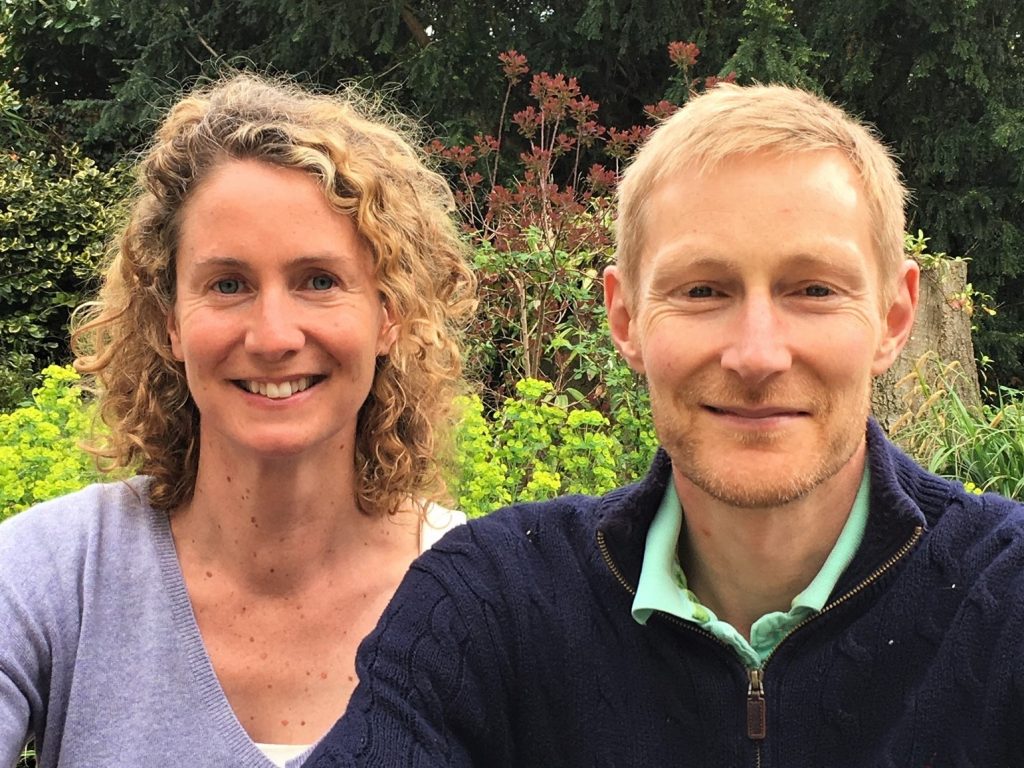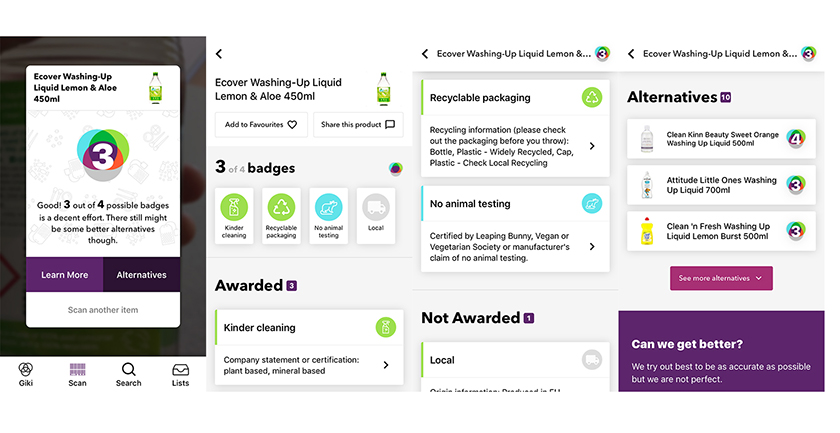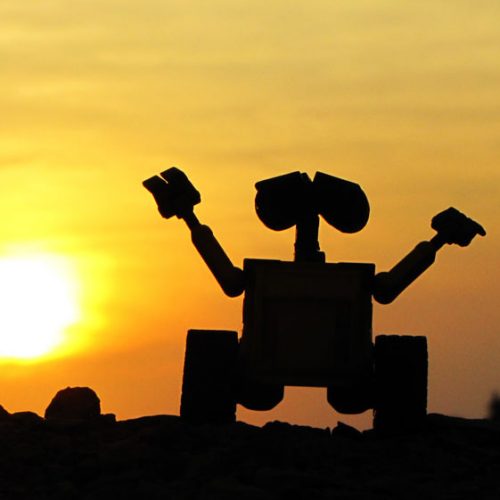It may sound surprising but for ethical startup co-founder James Hand, the inspiration for his vision to effect fundamental change to more ethical buying habits was a twenty-year investment career in the city. A career that witnessed huge changes in attitudes towards sustainability and ethics not only shaped this founder’s ideas, but led to a landscape where he felt a huge desire to impact change. For James and his wife and fellow co-founder Jo, this translated itself into the creation of a new kind of mobile app…that and an obsessive love of data!
In 2016, James and Jo Hand both had the same idea inspired by different perspectives. James had been working in firm management at Investec and understood the power of data and how, if harnessed, it could make it easier for people to know more about the products they were buying. Jo, on the other hand, a successful journalist who after covering a story about sustainability charity CDP, went on to work for them and the charity sector, got to understand these issues first hand. She knew that if they could make people more aware then they would make better decisions themselves. The result was ethical startup Giki, a sustainable shopping companion that gives users all the information they need to make better-informed decisions about the products they’re buying based on what’s important to them, whether that’s ethics, sustainability or health.

We spoke to James about his time in the city, his values, his love of data and his vision for helping people make small shifts in order to effect more fundamental change.
What was your background before Giki?
I worked for 20 years in fund management and became co-CIO of Investec looking after seven different investment capabilities. So literally, everything from African real estate to investing in US large cap stocks, and it was a really entrepreneurial, fun place to work. It was a really, great time. But yeah, after 20 years, I decided to do something different.
How much of your work at Investec would you say was ‘ethics-aligned’?
In investing there’s a term called ESG (environmental, social and governance) and in 2010 I started the ESG team at Investec. I also was one of the founding members of the Investec Governance Committee which tries to make everybody in the firm think about all the ESG issues when they’re investing. When we first started doing it, it went from being sort of general raised eyebrows, to when I left being just an absolute necessity.
Watching the growth of the team, the way people considered it, the pushback that we got along the lines of ‘who cares it’s about the financial return’ and then watching those opinions adapt, that was a really big part of seeing ethics in action. But, if I’m honest, it also kind of highlighted to me some of the challenges of bringing a lot of ethical investing to finance because, in the end, it is a lot about financial returns, and there’s quite a bit of tension there for people.
Was there an element of personal interest there?
Yeah, my view is that you need to do this, because these things really matter. Companies have a huge amount of power, whether that’s their supply chains, their employees or the relationships they have with government and regulators, to make a big environmental and social difference. So, as an investor, this is the right thing to do.
you can no longer say, ‘we just don’t care’
And actually, as you often see is the case, as the commercial imperative then caught up with it, clients also wanted you to be thinking about these things, so actually, it was a necessary part of winning business too. Also, because one of the cultural terms we had at Investec was ‘do the right thing’, as a firm it was actually quite up for trying it out, even if at that point that we didn’t have the commercial backing to do it.
Investec aside, how much do you think, then and now, companies are being ‘ethical’ because they want to do it, or they want to be seen to be doing it?
It’s a really good question. So I’d say there’s been a transformation on both of those so that you can no longer say, ‘we just don’t care’, that’s pretty much not acceptable anymore. So you definitely do get a group of companies that do it because they realise that for their customers, they need to do it. And then you get another group of companies for whom it’s actually quite core to their purpose that they need to address these issues. With those companies, you often find that the ones who tend to think about their employees the most, often are the ones that are most considerate with their supply chain, who are also the ones that are thinking about disclosing their carbon footprint.
So you can kind of sense from a company when they’re doing it because it’s a hygiene factor or when they’re doing because it’s for purpose. But both of those two cohorts have grown a lot, which is really, really encouraging.
So on a personal level, have you always been attuned to an ethical way of living?
It’s hard to answer without sounding smug but as you learn more about the issues and the more you’re exposed to in the media, the more concerned you are about them, and that in turn affects your behaviour.
The one thing I’ve probably learned is less about me and more about other people. It’s that everyone’s got their issues that they care about. And that’s the interesting thing for me. We hear this a lot from users of the app, that a lot of people are on a particular metaphorical journey, health been quite a common one at the moment. But as soon as they take that first path on a journey, they’re willing to think about some of the other stuff out there too. So, bit by bit you learn more and hopefully change the way that you act which translates into what you intend to do in practice.
And that’s the thing with Giki, you can clearly use it to focus on that area that you’re passionate about…
Yeah and that was one of the reasons we wanted to build it with badges rather than a ‘final score’. I can’t tell a meat eater to be a vegan, that’s a personal choice. It’s kind of preachy to try to attempt to do that, so you want to display as much of the information that you can, and then people will pick and choose, or choose to ignore it if that’s what they want to do.
On that point, have there been any turning points in your life that made you think differently about ethics, or sustainability?
Definitely having kids, that’s a big one. When you’re thinking about someone else, in terms of chemicals in their products, additives in their food… It is remarkable how many young kids have allergies compared to people of our age. It’s astounding, something’s definitely happening. And all of those things, they definitely make you think more and more. And it made me think more about both the products we were buying but also the lifestyle that we wanted to lead.
Can you tell me a bit about the vision for Giki, and how that came about?
I was looking at it from my history of looking at data against all this information out there about products and companies. We just needed to find a way to tie it together so that it makes it really easy for people. And Jo was coming from the perspective of, sustainability being this big problem that people care about. She felt that if we could just show them how they care, then they will do the rest.
I genuinely love the idea that we actually might be able to help people make little changes
We used to love going on long walks and talking about this stuff, and one day we just thought it would be a good idea to find out whether it’s an idea that you can actually translate into practice – so we ended up putting in place a plan to do the research and try and build a prototype. The other thing was we had some friends around and were talking about it with them – which is when individual issues became very apparent. Everyone thought it was a good idea but everyone had their own issue. That was quite good early on for making us realise that if it was going to be useful to people, it couldn’t be about what we thought, it had to be about everything that people might think.
Do you think there was anything about your time in the city that helped shape Giki?
There have been a few things have been really helpful. One is the data, I spent a lot of my time working on data. And the second was that I’m an avid student of behavioural finance and I used to guest lecture at Reading University. The way that people make decisions in finance is very akin to the way people make decisions in their everyday life. And realising that we’re not rational or sensible, we don’t conform to any of the economic norms and we do stuff based on instinct made me recognise that we need to get the data, but then we also need to have a mechanism to get the decision making right. So those parts of my time in the city were really, really helpful.
If there’s ever a question about a commercial decision, the mission always comes first
As a startup founder, how do you balance the ethical vision of Giki with a need to grow as a business, but still retain your values?
The approach we’ve taken is that the mission always comes first. If there’s ever a question about a commercial decision, we always take it back to the mission. So, there’s always a consideration, but there’s never any conflict as a result, because actually when you think about back on the mission you’re trying to achieve, it’s normally pretty clear. The other thing we try and do is always put ourselves in the place of the people using the app and how might they feel about something.
So a simple example would be in the ‘alternatives’ section of the app. We could start serving advertisements here because we’ll get paid. That’s a very feasible business model, and a very common one. But, how does someone who’s using an app that is a social enterprise and is trying to show transparency of products feel about that? I’m guessing the majority would be deeply unhappy. So I think those two things, what have we written down that we’re going to do, and how does the end user feel about it? That helps us make sure that in terms of the balance, the mission always comes first.
And is that mission public?
Exactly, that’s run into all our articles and is on public record because we thought it was really important to do that because it’s there for everybody to see.
Would that be the advice that you’d give to other businesses, maybe those with a slightly different business model to you, as a way of keeping that purpose in sight?
For somebody who’s running an ethical startup as a social enterprise, then yes, definitely think about making it formal like that. For somebody who’s running a non-social enterprise company, then they might prefer to have it in the mission statement or the principles or something like that, but you definitely need to find a way to to get it written down and make it clear, and then you need to live it. So writing it down is fine but then if anyone at Giki sees Jo or I making a decision based on the commercial imperative rather than the mission, the whole thing breaks anyway. So it’s your actions that are as important as the framework you put around yourself when you write out your mission out on paper.
I love the data, it’s really exciting
So what would you say is your key motivation?
I genuinely love the idea that we actually might be able to help people make little changes. My favourite thing about Giki is when someone tells me “I really liked the app and it gave me confidence in what I was buying, it helped me on the journey I was on, I did a product swap from this one to another,” it’s the really individual stuff that gives me a real buzz.
The other part is, and it’s very geeky, but I love the data – it’s really exciting. We’re in this incredible era of data democratisation, and if you know where it is, and how it can be connected, there’s some incredible stuff that you can do. Now, a lot of that data is being gradually sort of ‘walled gardened’ which is not a good thing, but there’s still some fantastic sets of data out there. It’s fascinating to know that you can connect a data dot over here to one that looks totally unrelated and tell a good story. I get a lot of enjoyment when those ones come together, as well as a lot of frustration and trying to throw to the laptop out the window in the background too!

You obviously deal with a lot of product data through the Giki app, and that’s a whole other side of ethics, having an ethical viewpoint on using data for good…
Yeah, and I think a lot of a lot of us have basically sleep-walked into losing control over a lot of our data, and for good reason, partly because we just weren’t sure what was happening. And also, sometimes we’re getting very good services on the other side of it. And now 2018 feels like what a watershed, people are realizing firstly, they don’t want to data being used for things they’re not comfortable with, and secondly, a gradual realization that data is actually a very valuable asset. Both those two things are kind of starting to pull it back in the other direction.
How do you think we make sure then that we’re not cutting off that data so much that we’re hindering progression for society and technology?
I think that’s a really tough problem, but one part of it just has to be transparency of where your data has been used, how and what would you think the value of that data might be, and then you can make a conscious decision about it. I imagine most people faced with that decision will go, you know, what, my Google, my Facebook, “yeah, I’m very happy with that trade-off as it’s a superb service.” Some people might not, but it’s just making sure that they’re fully aware of what the terms are, and the terms and conditions are not a fifteen page thing to read through that you just click, it’s being very explicit about it.
And make sure we’re not scaremongering people so that people just think that data is a nasty word?
Yeah, and that’s one of the real challenges of taking complex problems and conveying them in a way that’s accurate. We’re seeing it a bit with the plastics debate at the moment. Blue Planet had an amazing effect on people’s perception of plastic and the result has been now that plastic equals bad. In most cases, that’s probably right, but in quite a lot of cases it’s not, whether its food waste, whether it’s the fact most of the plastic in the ocean doesn’t actually come from the UK, it comes from other places, whether it brings in other materials that we can’t recycle in the same way, they’re really tough problems. So yeah, conveying the hard messages in a simple but accurate way is a real challenge.
Are there any other ways, aside from what Giki’s obvious focus is, that you try and apply a responsible or ethical approach to what you do?
To caveat with that this is that it’s my personal thing and everyone’s got to make their own decision. I genuinely believe that people’s nature is basically good and, give them the right information, they’ll tend as a group to make good decisions. But, my wife and I have basically cut out the vast majority of our air travel, we try and go maximum once a year because, in terms of your carbon footprint, that’s that’s the big one.
Personally, I’ve gone vegetarian this year and, again, it’s been quite an interesting one in that my reasons for being vegetarian are animal welfare and carbon footprint, not the actual killing of the animals. To a vegetarian or vegan, that seems like a very strange position to take but that’s mine and you’re getting lots more people eating less meat for their health or carbon footprint side of things. Also, we’re just trying to think what we can do in life that essentially has no impact on us really, but has some sort of additional sustainable benefit. That could be as simple as doing more recycling to buying a bit less meat to getting the train rather than the car. It’s all those little things that can actually be quite fun and full of discovery. It’s not all sandals and granola crunching!
To apply for investment for your early-stage startup, just fill out this application form.



